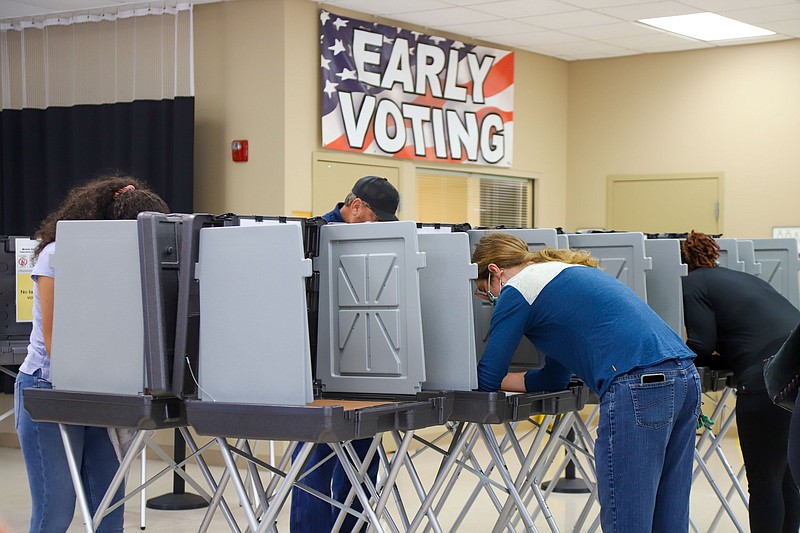After six years years of election-related lies that effectively redefined American politics, there's a hope both parties' candidates will recognize the desperate challenges many citizens face.
They have opportunities -- and an obligation -- to conduct campaigns that will represent the best politics they can offer to voters. The 2024 political cycle is just a year away, time enough for candidates to focus on their constituents' concern for the future.
For two years Americans have endured more political angst than a body can stand. One could argue that if more Americans took a vow to reject new efforts to tempt them into new political controversies, the better off they would be.
For example, the organization Tennessee Stands has posted online a "TN Voter Petition" calling for drastic changes in how Tennessee conducts it elections, ostensibly to ensure the accuracy of future elections. Yet the absence of any serious issues in November's elections suggest the hallowed privilege of voting has plenty of integrity.
The website of the petition (TN Stands is one of a coalition of extreme groups and individuals pushing the petition) shows that about 4,000 voters have signed the petition so far, a minuscule percentage given that there are more than four million registered voters in the state.
That suggests Gary Humble, executive director of TN Stands, could face pushback from some state legislators wary of angering Democratic and Republican voters since the petition appears to be a solution desperately in search of a problem. (Not Tennessee state Sen. Janice Bowling, R-Tullahoma, however, who is a member of the coalition. In February 2021, she introduced and then withdrew a bill similar to this.)
In a bold headline, TN Stands asserts: "Abolish electronic voting in TN." That demand is paired with two other proposals that could undermine regulations that have long ensured well-run elections in Tennessee.
One proposal argues for a return to precinct voting, meaning everyone should vote in person, using "currency grade, control numbered, hand-marked paper ballots" for "the highest standard in ballot authentication."
Another advocates a "return to same-day voting" (no early voting). If adopted that would would effectively codify a contempt for voters by eliminating a practice that has served Tennessee voters well for decades.
The platform upon which the petition is based asserts: "After the perpetual [definition: 'continuing forever'] fraud we continue to experience in our elections across the country, we know that now is the time to do everything we can to ensure that our elections [in Tennessee] are secure."
TN Stands argues that "technology can never outperform the time-tested value of paper ballots, and the ability to physically count and verify the vote of every Tennessean."
And in presenting four initiatives intended to ensure election integrity in Tennessee, the organization asserts: "We are not interested in becoming the next Georgia or Arizona." Translation: that suggests TN Stands believes there were deliberate voting irregularities in both states during the last two national elections.
The problem: There has been no conclusive finding that either state experienced voter fraud. In fact, an Associated Press report published on Dec. 11 in the Times Free Press debunked the claim that "uncounted ballots that got mixed with counted ballots in Arizona's Maricopa County were not included in the final midterm election results."
An "explainer" by National Public Radio quoted Charles Stewart III, director of the MIT Election Data and Science Lab, told The Washington Post:
"Computers -- which ballot scanners rely on -- are very good at tedious, repetitive tasks. Humans are bad at them; counting votes [by hand] is tedious and repetitive." Stewart, NPR noted, coauthored a study in 2018 that found ballot scanners to be more accurate.
In other words, a campaign to force more Tennessee counties to hand-count ballots ignores findings showing that hand-counting leads to more, not fewer errors. If Tennessee were to adopt the argument for abandoning electronic voting and resume the practice of hand-counting votes (and foolishly abandoning early voting) thereby ensuring "election integrity," it could ironically undermine Tennesseans' faith in that vital democratic process.
Finally, such a change could also create financial consequences as well. As the NPR report noted, according to Jennifer Morrell, an elections consultant and former local voting administrator, "Moving back toward hand-counting ballots would also significantly increase costs for local election offices that are perennially under-resourced." Further, "the staff size at almost every election office across the country would need to exponentially increase, and even then, hand-counting dozens of races on tens of millions of ballots would probably take weeks or months."
What a recipe for more chaos and distrust.
Michael Loftin is a former editorial page editor for The Chattanooga Times.
